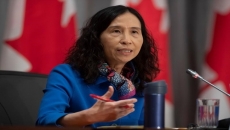A newly released document reveals that in May 2011, police were told the Nova Scotia man who would later kill 22 people in a shooting rampage wanted to "kill a cop" and was feeling mentally unstable.
The officer safety bulletin, submitted by the Truro Police Service, does not include names in the version released to media, but police Chief David MacNeil confirmed Friday the subject in question was Gabriel Wortman.
The brief report says a Truro police officer had received information from a source indicating Wortman was upset about a police investigation into a break-and-enter and had "stated he wants to kill a cop."
The officer goes on to say he was told Wortman owned a handgun and was having some "mental issues" that left him feeling stressed and "a little squirrelly."
The document, first obtained by the CBC, says Wortman was also investigated for uttering death threats aimed at his parents less than a year earlier in June 2010, which led police to conclude he may be in possession of several rifles.
MacNeil says the patrol officer who prepared the bulletin — Cpl. Greg Densmore — submitted it to the Criminal Intelligence Service of Nova Scotia for analysis and distribution to other police forces.
"Our officer did exactly what was expected of him," MacNeil said in a statement Friday. "He took the information seriously, documented it and submitted this information."
MacNeil said it was safe to assume the Amherst Police Department also received the bulletin because it was one of their officers who retrieved it from files on April 18, 2020 — the day Wortman's rampage started — and sent it to those investigating the unfolding tragedy.
"Since neither of the addresses mentioned in this information were in the jurisdiction of the Truro Police Service, we were not obligated to follow up on this information, as this would fall to the police agencies of jurisdiction," MacNeil said.
"We can't comment on what those agencies may have done or didn't do with this information."
At the time, Wortman had a primary residence above his denture clinic in downtown Dartmouth, N.S., which is an area covered by Halifax Regional Police. As well, he owned properties in Portapique, N.S., which is about 40 kilometres west of Truro and part of the RCMP's jurisdiction.
MacNeil said this kind of bulletin would normally be sent to all municipal police agencies and the RCMP, which has been leading the investigation into last month's shootings.
The Mounties have confirmed the gunman — disguised as a Mountie and driving a replica RCMP vehicle — was armed with two semi-automatic handguns and two semi-automatic rifles when he killed 13 people in Portapique, N.S., on April 18 and another nine people the following day in several other communities.
His victims included an RCMP officer, two nurses, two correctional officers, a family of three, a teacher and some of his neighbours in Portapique.
After Wortman spent the better part of 13 hours terrorizing people in northern and central Nova Scotia, a Mountie fatally shot the 51-year-old at a gas station in Enfield, N.S., about 90 kilometres south of Portapique on the morning of April 19.






